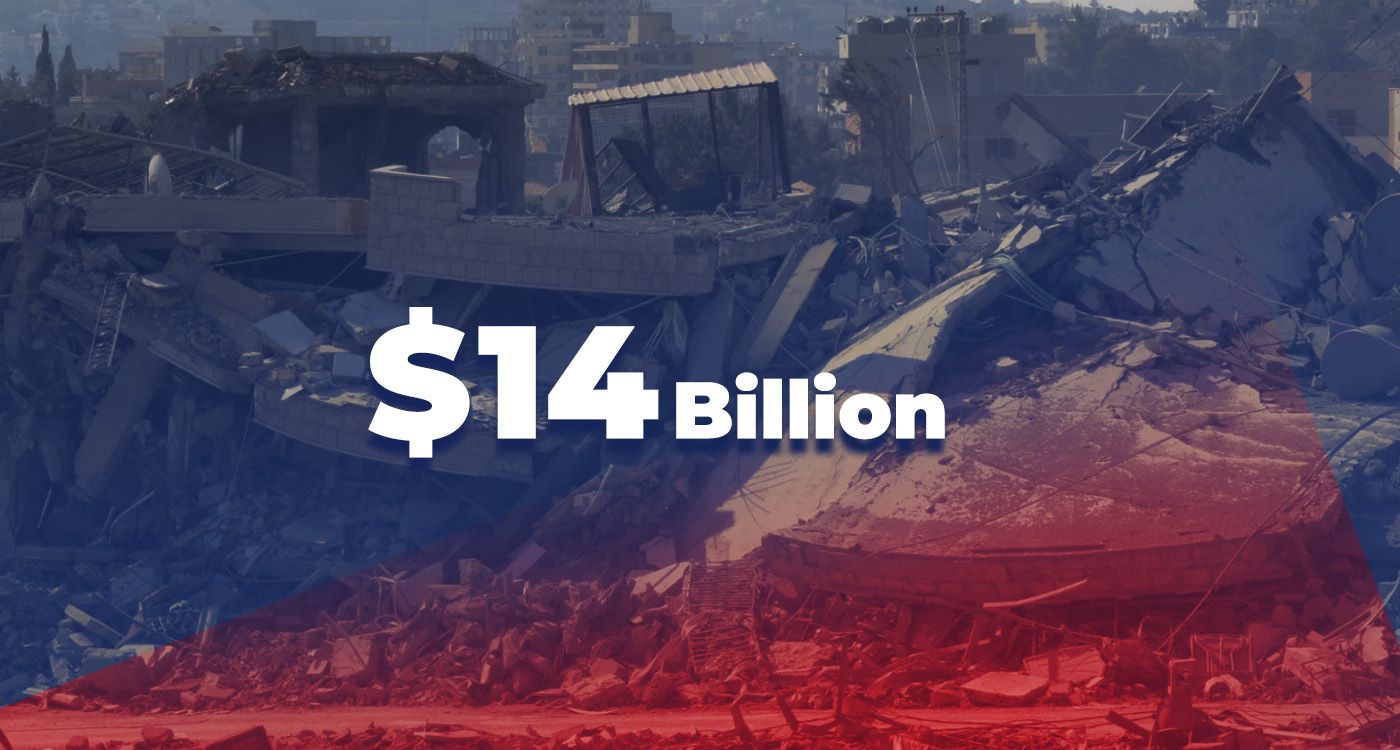
According to an almost final estimate by the World Bank (WB) revealed earlier this week during a meeting at the Grand Serail dedicated to this issue, the damage caused by the conflict between Hezbollah and Israel is estimated at approximately $14 billion. A colossal sum for Lebanon, already struggling with a crippled economy.
$14 billion! That is the historic and no less colossal amount of damage caused by the conflict between Hezbollah and Israel. This sum includes both material damage and economic losses. The reconstruction costs are estimated at around $12 billion.
For Nassib Ghobril, chief economist at Byblos Bank, economic losses amount to at least $3 billion. He points out that the reconstruction method will be completely different from that of 2006, which began as soon as the war ended. “There was more liquidity circulating in the country,” he says, “and financial aid was flowing more easily.” This time, the destruction is much greater than the one caused by Hezbollah’s 2006 war against Israel, and the funds allocated for reconstruction will no longer go through traditional channels.
Ghobril underlines that the villages in the South are entirely destroyed; therefore, the focus is on development plans (roads, water, electricity, telecommunications) rather than rebuilding buildings. Regarding the reconstruction of the southern suburbs, he believes an urban plan is necessary.
Researcher at Information International Institute, Mohammad Chamseddine, provides precise figures on the extent of the damage. He states that, according to statistics, 51,000 residential units have been completely destroyed, distributed as follows: 9,000 units in the southern suburbs, 1,200 in the Bekaa, 22,000 in the coastal villages of the South, and approximately 12,000 in other southern regions. According to him, the initial estimate of damage costs is at least $8 billion, potentially reaching $10 billion in maximum cost scenarios, “a sum that no party is capable of covering.” Additionally, damage to infrastructure is estimated at $700 million.
Regarding the agricultural sector, Abdallah Nasreddine, adviser to former Minister of Agriculture Abbas Hajj Hassan, states that Israeli bombings have left deep scars. Agricultural lands intended for wheat, vegetables, and fruit cultivation have been devastated, leading to the total loss of crops that should have provided income to farmers. Irrigation networks have also been destroyed, disrupting the water supply needed for agriculture. Moreover, the land has been contaminated by bombings, with detrimental effects on soil quality. Traces of chemicals and toxic substances such as white phosphorus have been found, posing a significant threat to future agricultural production.
Mines have also been scattered, further complicating agricultural activities in certain areas. Most agricultural installations, including greenhouses, storage silos, and processing facilities, have been annihilated. The South and Bekaa regions have suffered significant losses in livestock, impacting meat and dairy production. Olive groves, a pillar of Lebanese agriculture, have been severely damaged, with around 60,000 olive trees destroyed, resulting in substantial economic losses. He notes that the contamination of surface water with toxic substances has affected the wildlife and flora of the impacted regions, particularly in the 54 border localities with Israel.
Regarding the private sector, the CEO of Sacotel and president of the Family Business Network (FBN), Ricardo Hosri, estimates that the losses resulting from the war-induced revenue shortfall amount to over $50 billion in the long term, considering businesses that could not operate, those that lost contracts, and those that relocated abroad.
Reconstruction Based on International Aid
“Finding the necessary funds for reconstruction will be a challenge,” says Ghobril. Indeed, to finance reconstruction, “Lebanon will have no choice but to rely on the international community. The World Bank can lend a certain amount, but it cannot lend billions to Lebanon.” In this regard, Finance Minister Yassine Jaber confirmed that the World Bank has already allocated $250 million, stating that the rehabilitation of basic services (roads, water, electricity) in destroyed regions was the priority. Meanwhile, the World Bank has proposed creating a transparent reconstruction fund. During the recent meeting at the Grand Serail, members of the WB delegation emphasized the need to establish a dedicated fund for reconstruction, coupled with reforms to ensure transparency in the use of funds. This key message aims to restore confidence and solicit international aid.
For its part, the European Union (EU) has announced, via European Commissioner for the Mediterranean Dubravka Šuica, aid amounting to half a billion euros “if the criteria are met.” This amount is the remainder of the €1 billion package already approved by European Commission President Ursula von der Leyen, the first half having already been disbursed last August.
Ghobril indicates that Lebanon will therefore “have to rely on donations from Gulf countries, which have expressed their support and willingness to provide financial assistance, though conditioned on concrete changes in Lebanon’s foreign policy.” He noted that these countries are waiting for Lebanon’s reconstruction plan, which is being developed in collaboration with the World Bank.




Comments